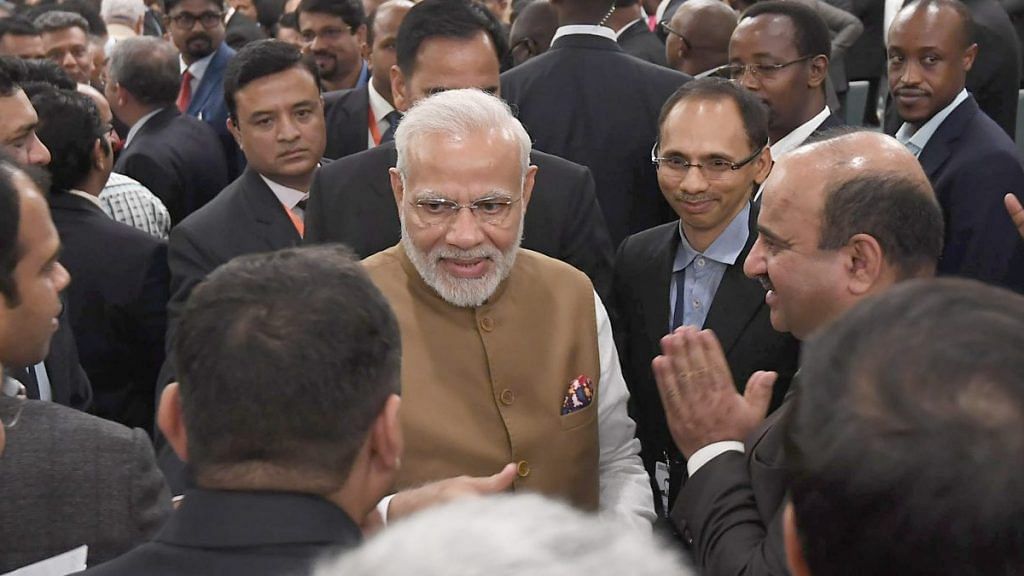Modi’s carpet bombing-style rallies would overcome the negative image of the state governments in the elections, they thought.
The corporate class in India is in a state of delirium and what medical experts call an “acute confusional state” of mind. The highfalutin and suited-booted executives are in this state of self-inflicted paranoia after the assembly election results in Rajasthan, Madhya Pradesh and Chhattisgarh.
Six years ago, soon after the results of the Gujarat assembly election, which brought Narendra Modi to power for a third time as the chief minister, this class was ecstatic. The corporate chorus cheering Modi was led by Ratan Tata, Anil Ambani, Gautam Adani and even N.R. Narayana Murthy, the icon of Silicon Valley intellectuals. Stock market studs like Rakesh Jhunjhunwala and self-declared economist and psephologist Surjit Bhalla were on cloud nine.
India’s Silicon Valley in Bengaluru and tech hubs in Mumbai and Delhi, along with much of the NRI community and their cousins, joined the Narendra Modi chorus. India was, they said, on the cusp of radical, neo-liberal transformation. Some wrote that India’s ‘Thatcher Moment’ has come. Others thought Modi could bring the ‘Ronald Reagan Revolution’ to India. This corporate class had huge support not just from the NRIs but also from the American business establishment.
Also read: BJP has to learn to befriend the kingmakers of 2019
This hype reached its peak and the term “Modinomics” was coined. The decibel level of this corporate noise was so high that, some argue, it went to Narendra Modi’s head. The media likened him to ‘Alexander the Great’ (although surely he did not know about the history of Alexander).
Sardar Vallabhbhai Patel suited Modi’s local idea of greatness and historical ignorance. The narrative that poor Patel had missed the opportunity to become the first Gujarati Prime Minister because of the alleged cunningness of Jawaharlal Nehru gained ground. So, Modi and his supporters made it a habit to attack Nehru as if he was still around and ridiculed his great-grandson Rahul Gandhi. So, it became a proxy war between Nehru and Modi. The WhatsApp warriors ferociously attacked the Nehru-Gandhi-led Congress – they excelled in the targeted and systematic maligning of personalities and communities like we have seen in German history.
The corporate brigade, including highly paid IITians and IIM-syllabus trained young soldiers from various business schools, joined the vast army of social media outfits. Thousands of them found jobs with these troll armies. The alleged job was simple and the remuneration high: invent stories, generate calumny, spread slander, circulate fake news and destroy Nehru’s legacy.
Interestingly, those who got mesmerised by this media blitz were executives working with big, medium or even small business enterprises. They actually believed that there was an inspiring dawn after a long dark Nehruvian night. This is when the myth of invincibility of Narendra Modi and Amit Shah began to get entrenched. The BJP’s majority in 2014 was attributed to Modi’s aggressive, imaginative and oratorical campaign.
Also read: This election loss has 10 lessons. BJP can choose to learn them or kiss 2019 goodbye
Therefore, the 2019 election, they thought, would be a repeat of 2014. The so-called semi-finals of assembly polls did not worry them much. Modi’s carpet bombing-style rallies would overcome the negative image of the state governments, they were sure. That is why the 3-0 performance of Congress shook them out of their complacency, and after four years, they have visibly lost confidence.
At private gatherings and cocktail parties, in closed-door conference rooms and hush-hush conversations, they have begun to express their frustrations, total disillusionment and their business crises, especially after the chaotic implementation of the GST and the ‘mindless’ demonetisation. They are even expressing their fears and apprehensions about possible Enforcement Directorate or Income Tax raids. They are seriously concerned about the RBI governor’s resignation and the appointment of Shaktikanta Das, who is known neither as an economist, nor as a business-friendly officer.
But the defeat of the BJP was significant in other respects too. Amit Shah’s alleged game of creating a fifth column in Chhattisgarh by encouraging Ajit Jogi-Mayawati alliance has miserably bombed. Jogi had already begun to behave as if he was the chief minister-elect. And Mayawati was threatening the grand old party as if she was the chosen candidate for prime ministership. ‘Who Rahul and What Congress’ was the refrain.
But 11 December proved to be a ‘Black Day’ for all the anti-Congress parties and Rahul Gandhi detractors. The headlines on TV that night and in next day’s morning newspapers echoed: “Rahul Gandhi halts Modi Vijay Rath” or “Rahul halts Shah Juggernaut” or “The Son has Finally Risen”. The media loves hyperbole, and the win in the two big states (Rajasthan and Madhya Pradesh) was treated like it was a landslide.
Also read: Results of 5 assembly polls will decide contours of opposition alliance, say leaders
There was no Congress face in Chhattisgarh, but there was a landslide. The Telangana and Mizoram losses did not make headlines, because they were not ‘test matches’ like the ones played in the Hindi Heartland. But for the Supreme Court judgment on the Rafale deal, the BJP had lost face and its spokespersons their speech. (The court, however, has not addressed a single question posed by the Opposition, mainly the Congress. The issue of price and allocation of the Rafale offset project to Anil Ambani’s firm, allegedly sidelining the HAL, remains).
The corporate executives and their masters, meanwhile, are in a state of panic now. One can empathise with them or laugh at them. Their oversized egos and delusion have created this Black Comedy-like situation now.
Kumar Ketkar is a former editor and Congress member of Rajya Sabha.
